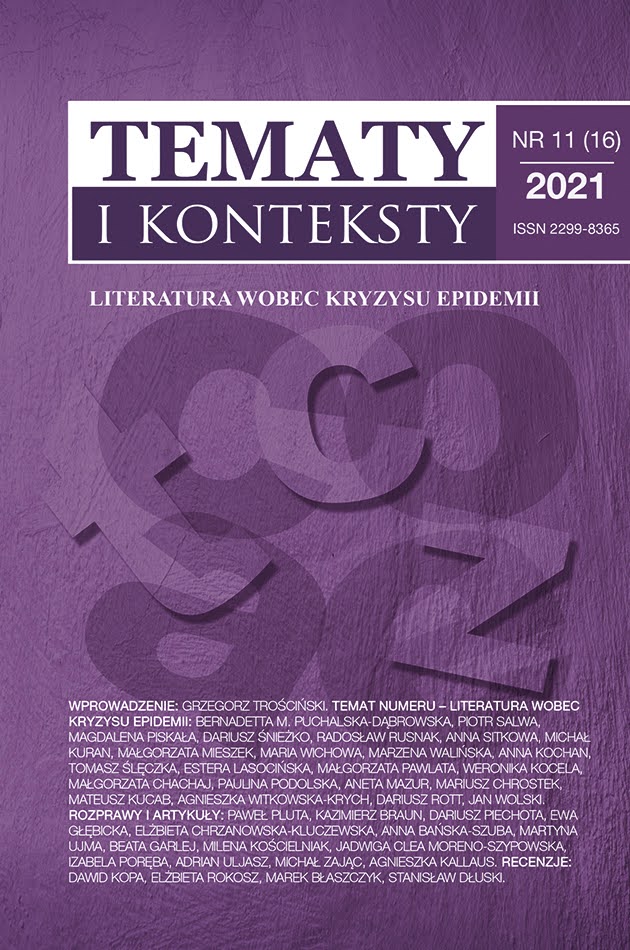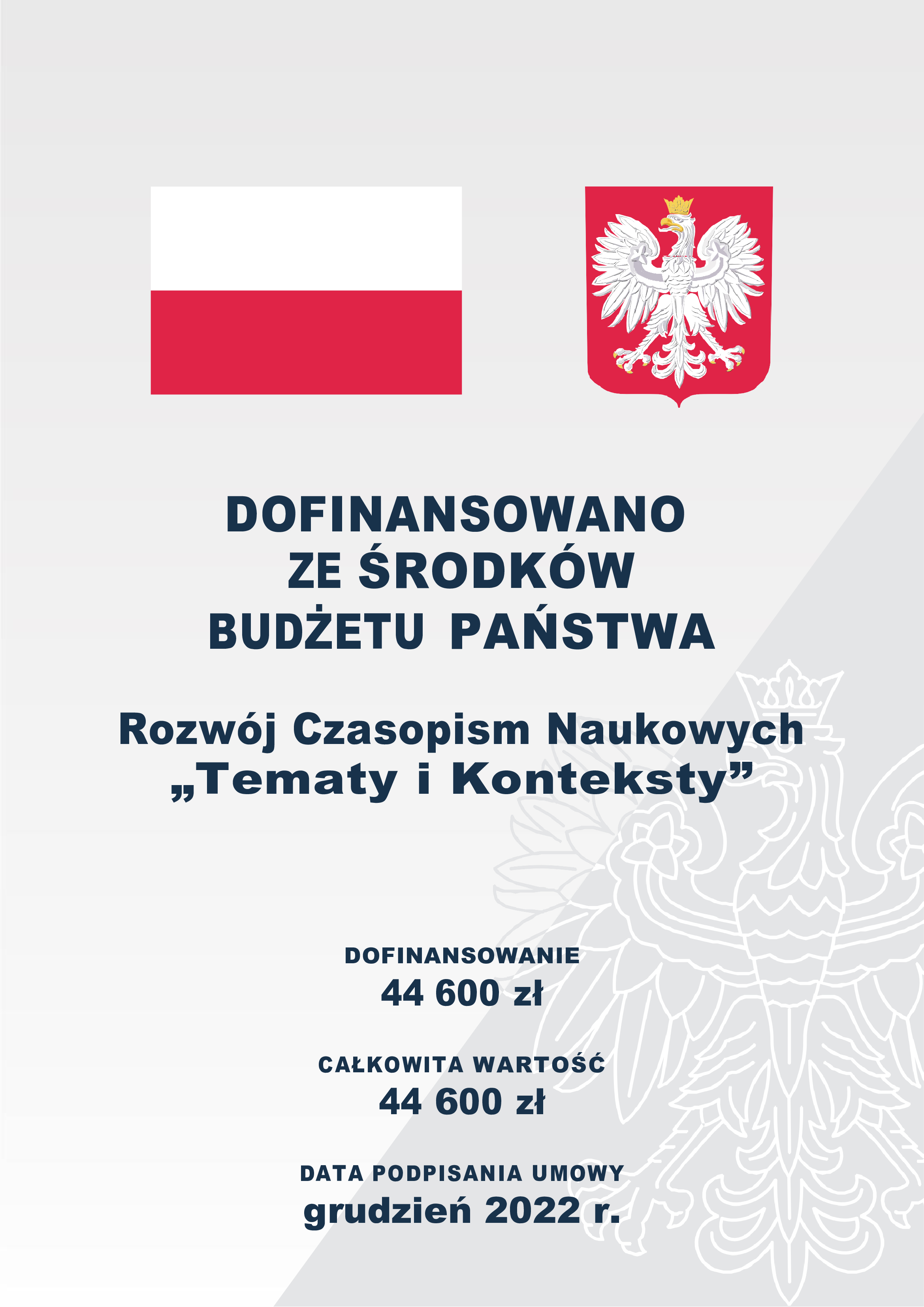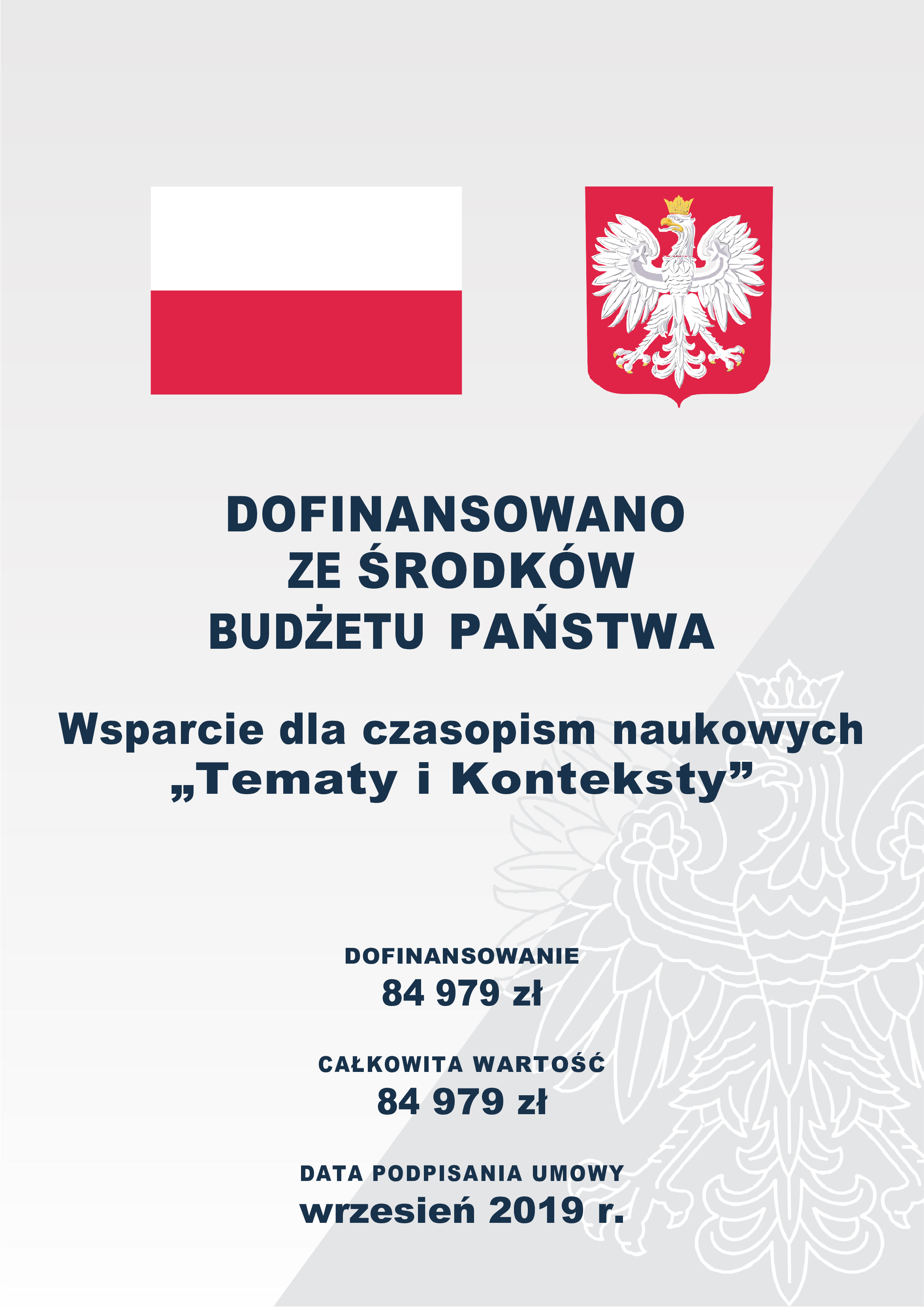What is Filipowicz dreaming about? – an Attempt to Analyze Kornel Filipowicz’s Story Gdy przychodzą we śnie (When They come in a Dream) from the Perspective of Broadly Understood Eexistential Philosophy
DOI:
https://doi.org/10.15584/tik.2021.30Keywords:
Kornel Filipowicz, When they come in a dream, existentialismAbstract
The purpose of the article is to interpret the story Gdy przychodzą we śnie (When they come in a dream) by Kornel Filipowicz using the category introduced to literary studies by Michał Januszkiewicz - the so-called existentialist point of view. It is a procedure aimed at discovering the meaning of the exceptional text, as it does not fit into the typical themes of Filipowicz, the eulogist of the Polish province, and the bard of everyday life. The work was written in 1979 and was published in the collection Koncert f-moll i inne opowiadania, published in 1982. This story, making a great impression on today's reader because of the exceptional topicality of the topic, which is the phenomenon of mass immigration from African countries to Europe, evokes the desire to ascribe to author of prophetic abilities. This is the source of many misunderstandings, which in turn leads to the conclusion by researchers of this prose that it is not easy to reach its essential meanings. Hence, an interesting proposal is to look at it from the perspective of broadly understood existential philosophy, in particular the thoughts of Heidegger, Sartre, Jaspers, Camus, thinkers who cannot be ignored when discussing contemporary literature. From this perspective, this unique story takes on new content. It leads, if not to a full understanding of its meaning, then at least to the discovery of previously hidden meanings.
Downloads
References
Camus A., Człowiek zbuntowany, Kraków 1992.
Filipowicz K., Gdy przychodzą we śnie, w: tegoż, Koncert f-mol i inne opowiadania, Kraków 1982.
Gombrowicz W., Dzienniki 1953–1956, Kraków 1988.
Jaspers K., Sytuacje graniczne, przeł. M. Skwieciński, w: R. Rudziński, Jaspers. Wybór pism, Warszawa 1978.
Kundera M., Sztuka powieści, przeł. M. Bieńczyk, Warszawa 1991.
Sartre J.P., Egzystencjalizm jest humanizmem, przeł. J. Krajewski, Warszawa 1998.
Sartre J.P., Byt i nicość, przekład zbiorowy, Kraków 2007.
Buczyńska-Garewicz H., Język przestrzeni u Heideggera, cz. 1, „Teksty Drugie” 2005, nr 4, s. 9–28.
Buryła S., rec.: Michał Januszkiewicz, Tropami egzystencjalizmu w literaturze polskiej XX wieku: o prozie Aleksandra Wata, Stanisława Dygata i Edwarda Stachury, „Pamiętnik Literacki” 2000, nr 1, s. 213–219.
Chojnacka M. A., Czy mogę poznać innego? Problem relacji międzypodmiotowych w filozofii Jeana Paula Sartre’a, „Studia z Historii Filozofii” 2013, nr 4, s.137–155.
Dalasiński T., Nieoniryczna konwencja literatury snu, „Teksty Drugie” 2016, nr 5, s. 122–135.
Januszkiewicz M., Tropami egzystencjalizmu w literaturze polskiej XX wieku: o prozie Aleksandra Wata, Stanisława Dygata i Edwarda Stachury, Poznań 1998.
Januszkiewicz M., Od egzystencjalizmu do mistyki, „Pamiętnik Literacki” 1994, nr 4 (85), s. 96–115.
Kolasa D., Sytuacje możliwe a sytuacje graniczne w filozofii Jaspersa, „Studia z Historii Filozofii” 2000, nr 1, s. 135–145.
Kowalska M., W poszukiwaniu straconej syntezy. Jean-Paul Sartre i paradygmaty filozoficznego myślenia, Warszawa 1997.
Lipowski W., Niezwykła codzienność. Sztuka widzenia i pisania Kornela Filipowicza, Katowice 2012.
Michalski K., Heidegger i filozofia współczesna, Warszawa 1998.
Morawski S., Wątki egzystencjalistyczne w polskiej prozie lat trzydziestych, w: Problemy literatury polskiej lat 1890–1939, red. H. Kirchner, Z. Żabicki, przy współudziale M.R. Pragłowskiej, seria 1, Wrocław 1972.
Pieszczachowicz J., Ku wielkiej opowieści. O życiu i twórczości Kornela Filipowicza, Kraków 2010.
Przybylski R., Eros i Tanatos. Proza Jarosława Iwaszkiewicza 1916–1938, Warszawa 1970.
Puszko H., „Być Stendhalem i Spinozą....”. Szkice o filozofii J.-P. Sartre’a, Warszawa 1997.
Szydłowska W., Egzystencja-lizm w kontekstach polskich. Szkic o doświadczeniu myśleniu i pisaniu powojennym, Warszawa 1997.
Ziarek K., Ethos codzienności: Heidegger o poezji i języku, w: „Sztuka i Filozofia” 1999, nr 16, s. 59–76.
Downloads
Published
How to Cite
Issue
Section
Categories
License
Copyright (c) 2021 Tematy i Konteksty

This work is licensed under a Creative Commons Attribution-NonCommercial-NoDerivatives 4.0 International License.




